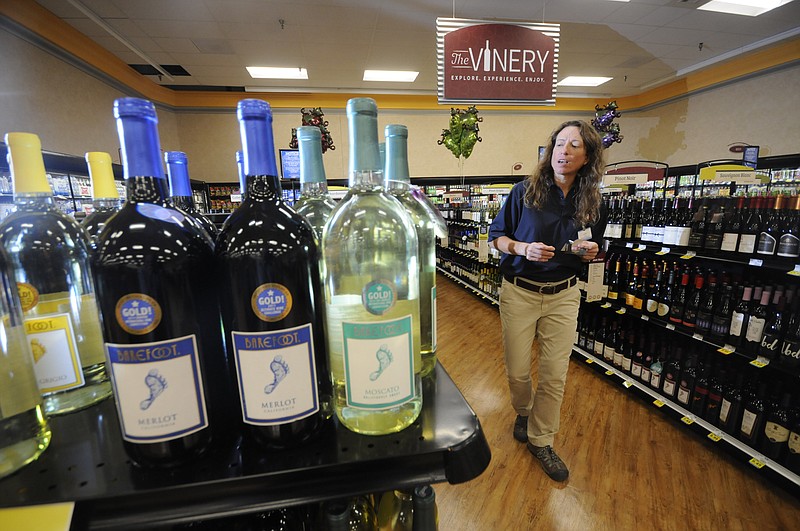NASHVILLE - Two years ago after persuading Tennessee lawmakers to let them sell wine, state grocery and convenience stores are now setting an ambitious new goal: repealing the long-standing ban on Sunday sales of wine.
Rob Ikard, president and CEO of the Tennessee Grocers & Convenience Store Association, said the grocers group is joining with Tennessee wineries and the Distilled Spirits Council to push for what he calls "seven-day sales."
"We think if there's ever a time to try it, it's right now, because we know our customers are really perplexed they can't buy wine in our food stores on Sunday when they can buy beer across the aisle," Ikard said.
He noted customers went "nuts" with delight when grocery stores began offering wine July 1.
"But then on Sunday, customers were told to put it [wine bottle] back on the shelf" because of the ban, he said.
"We think there's strong consumer interest in this," Ikard added, citing dozens of local referendums across the state where voters approved wine sales in food stores.
Because package liquor stores also sell wine, the proposal would allow them to open and they would be able to sell liquor too, Ikard and others said.
Both Rep. Gerald McCormick, R-Chattanooga, and Senate Republican Caucus Chairman Bill Ketron of Murfreesboro said they're strongly looking at sponsoring the legislation.
"I have talked to them about that and I probably will do it," said McCormick, who chose not to seek a fourth term as House majority leader for the legislative session beginning Jan. 10.
"I think it's just to make it consistent leave it up to the local operators and not the state," McCormick added. "I think most [Tennesseans] will go along with it."
He noted that Tennesseans already can buy wine or spirits by the drink on Sundays at restaurants with an alcohol license.
Ketron said that as part of the 2014 agreement on grocery store wine sales, he agreed not to take up the issue of Sunday sales for two years.
"I said we need to give those [small] retailers time to adjust their business plan," Ketron said.
Now, he said, some liquor store owners are seeing slower wine sales and want an extra sales day. Others don't, Ketron added, noting the Tennessee Wine & Spirits Retailers Association is split on the issue.
He believes the retailers as well as the distributors' organization, the Wine & Spirits Wholesalers of Tennessee, will be neutral on a bill.
Ketron said he isn't sure whether the idea of allowing liquor stores to sell distilled spirits on Sunday will cause some lawmakers who supported grocery store wine sales law to back off.
"That may complicate it a little, but I won't be sure until I actually introduce the bill," Ketron said.
David McMahan, who lobbies for liquor store owners, acknowledged that group is split on Sunday sales.
Some of the state's 600 liquor stores are seeing a fall-off in wine sales and want to shore up business with Sunday sales, while others are not having problems and don't like the idea of having staff work seven days a week, he said. It also makes no sense for many stores to open on Sundays if they can't sell distilled spirits too, McMahan said.
Until an actual bill is filed and his board can read it, sort through the implications and decide, it's difficult know how the group will respond. And liquor store owners will have to prioritize among issues, he said.
The retailers will oppose efforts by grocery and convenience store chains to tinker with a provision that requires food stores to charge customers a 20 percent markup over their own costs, as well as one that bans wholesalers from physically stocking shelves in food stores.
Such restrictions are "critical" for small businesses competing with huge national retailers, he said.
"Wal-Mart and Costco have not been good for most communities in Tennessee," McMahan said. "If you notice, they come to town and all of a sudden your hardware store goes out of business, the bicycle shop goes out of business, your sporting goods store goes out of business.
"You can look at some of these town squares and they're sort of ghostlike," McMahan added. "So [there's an interest in] protecting the negotiated tools that were in that bill that would allow the 600 small businesses across the state to continue to operate their business and hire employees and pay taxes. So that will be a big part of my job, making sure that those elements stay in the law and don't get reversed."
With only six months of sales in food stores to date, "we really don't know what the true effect of wine in the grocery stores is yet."
Contact Andy Sher at asher@timesfreepress.com or 615-255-0550. Follow on twitter @AndySher1.


